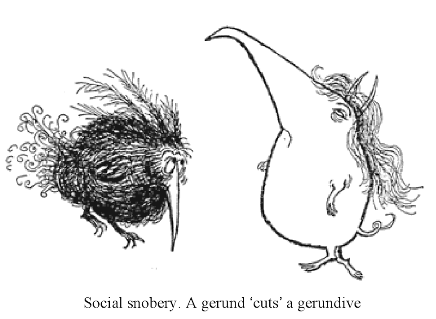Gerundive: Difference between revisions
Jump to navigation
Jump to search
Amwelladmin (talk | contribs) No edit summary |
Amwelladmin (talk | contribs) No edit summary |
||
| Line 1: | Line 1: | ||
A form of a {{tag|Latin}} {{tag|verb}}, having the (declinable) ending ''-ndus'' which functions as an {{tag|adjective}} meaning ''“that should or must be done”''. | A [[gerundive]] is a form of a {{tag|Latin}} {{tag|verb}}, having the (declinable) ending ''-ndus'' which functions as an {{tag|adjective}} meaning ''“that should or must be done”''. | ||
''There is [[gerundive]] in English; the closest translation is a expression like as “books to be read”, combining a transitive verb and its object with a sense of obligation. But wouldn’t you just use the inifinitive and avoid that ugly passive: "books to read".'' | |||
===Latin examples === | |||
*[[quod erat demonstrandum]] — ''because that is the very thing one seeks to prove''; | *[[quod erat demonstrandum]] — ''because that is the very thing one seeks to prove''; | ||
*[[mutatis mutandis]] — ''changed in ways that must be changed''. | *[[mutatis mutandis]] — ''changed in ways that must be changed''. | ||
Revision as of 15:21, 1 August 2017
A gerundive is a form of a Latin verb, having the (declinable) ending -ndus which functions as an adjective meaning “that should or must be done”.
There is gerundive in English; the closest translation is a expression like as “books to be read”, combining a transitive verb and its object with a sense of obligation. But wouldn’t you just use the inifinitive and avoid that ugly passive: "books to read".
Latin examples
- quod erat demonstrandum — because that is the very thing one seeks to prove;
- mutatis mutandis — changed in ways that must be changed.
See also gerund, which is capable of social snobbery.
